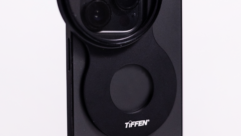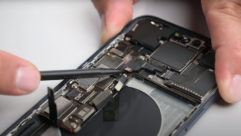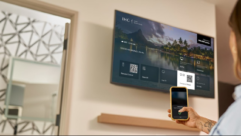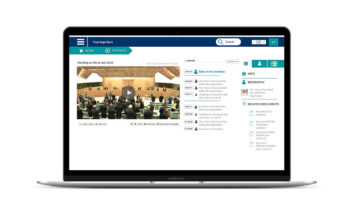iPhone, iPhone, iPhone
Jun 20, 2007 2:59 PM,
By Paul Thurrott
Well, at least give
Apple some credit for generating an unprecedented amount of hype.
Unless the upcoming iPhone smart phone is a total dud—and let’s face
it, that’s not going to happen—Apple has achieved the holy product
trinity of anticipation, lust, and—I’m guessing—short supply.
Furthermore, the company has cunningly handled the pre-release months
by easing out details about the product over time. Brilliant.
So, what’s the deal with the iPhone? Is this the must-have device of
the year, or is it just another road bump on the path toward mobile
nerdvana?
Given that I don’t have an iPhone in my hands—and, until recently,
didn’t expect to get one—I’m still a bit mixed on it overall. The
product looks decent, even excellent. It has the expected Apple design
touches and UI innovations. But there are some problems. Here are the
concerns that I think are relevant, as I now understand them. Things
might change as the iPhone’s June 29 release date approaches, and of
course Apple updates its products regularly, so expect even more
changes down the road.
Design. The iPhone is better looking than any smart
phone—period. It’s also bigger and heavier than most smart phone users
might prefer, so it’s a mixed bag overall. And what about that touch
screen? Will it scratch easily in your pocket, like an iPod? Stay
tuned.
Keyboard. The iPhone doesn’t include a hardware keyboard, which
makes it a non-starter for the two most important smart phone markets:
business users and users who regularly send text messages. I don’t care
how good Apple’s virtual keyboard is: Without a real keyboard, there’s
no tactile feedback, and thus you can’t type easily on it without
watching the virtual keys. Apple would have been better served by
providing the device with a slide-out keyboard. This is a key area in
which Apple has completely misread the market, and the company is only
making it worse by pretending that it has invented a new market.
Network. The iPhone will work only with AT&T’s cell phone
network, which has been disparagingly referred to as a “2.5G” system,
compared with superior 3G systems such as the Verizon EV-VO network
that I use. (On the flip side, the iPhone does natively support Wi-Fi,
which will come in handy, more so in the coming months and years.)
Switching mobile phone providers is expensive, and limiting the iPhone
to just AT&T will make the device artificially less relevant than
it could be. And if you’re in Europe, you’re just plain out of luck for
now: Apple hasn’t announced its European mobile phone service partner
yet.
Compatibility. Although the iPhone will work just fine with all
POP3 email accounts and will work in superior fashion with the natively
designed Gmail and Yahoo Mail systems, it won’t work with most
corporate email systems, which—in tandem with the lack of a real
keyboard—makes the iPhone a non-event in the business world.
Internet. My Motorola Q can browse the Web, and do so via its
superior EV-DO network, but most Web sites aren’t designed for the
device’s small screen, and finding sites that do work natively is
difficult and frustrating. The iPhone, by contrast, offers a “true” Web
experience because it has taken a desktop PC-based browser—Safari—and
jammed it into a mobile device with a nice, large widescreen display.
However, Safari is also an iPhone weakness because so few sites are
designed for this niche browser. Why, oh why, couldn’t Apple have just
gone with the superior Firefox browser? That would have made this
category a slam-dunk.
Battery life. Apple now claims that the iPhone gets 8 hours of
battery life for phone calls, which any cell phone user will
immediately peg as a ludicrous claim. However, Apple had previously
claimed just 5 hours, so something positive has happened here. A
user-removable battery would make all the difference in the world.
Storage. The iPhone comes with just 4GB or 8GB of storage,
depending on the model, which will limit the device’s ability to store
your entire media collection. Movies, which should look wonderful on
the iPhone’s widescreen display, are particularly problematic. A
typical 2-hour movie purchased from the iTunes Store weighs in at
around 1.5GB. Worse still, this kind of content will rapidly sap
battery life.
Availability. If you want an iPhone, be prepared for short-term
disappointment. You can order the device only through certain
non-franchised AT&T retail stores, Apple retail stores,
and—presumably—Apple’s online store. I say “presumably” because, as of
this writing, you can’t actually preorder an iPhone anywhere, get on a
waiting list, or even learn how the sales will be handled. Obviously,
you’ll need to sign a two-year commitment with AT&T, standard
practice in the US cell phone market. The details, alas, are lacking.
Pricing. The iPhone is expensive. Really expensive. Whereas I
was able to snag my Q for just $100 (or free, after a $100 mail-in
rebate), the iPhone will cost $500 or $600 depending on which model you
get—in addition to whatever monthly fees you pay through AT&T. This
pricing structure places the iPhone at the absolutely upper echelons of
the smart phone market. When you combine this fact with the
availability and functionality concerns I’ve noted above, you can see
some reality setting in: Yes, the iPhone will be successful. It’s most
definitely, however, not a good buy for most phone users.
Overall, I’m intrigued by the iPhone, mostly because I’m just now
transitioning from desktop-based email and personal information
management (PIM) software such as Microsoft Outlook to Web-based Google
services, and the iPhone’s interaction with these services is
top-notch. Traditional email and business users, however, will find
problems with the iPhone, as will anyone who pecks away regularly on
today’s smart phone keyboards. This situation, I believe, is the real
risk with the iPhone, although Apple could easily push into traditional
smart phone territory by releasing a keyboard-equipped iPhone in the
next year. For now, hype will win out over common sense, and I have no
doubt that people will be lining up to get an iPhone and create lines
reminiscent of those that greeted Star Wars Episode I: The Phantom Menace
several years back. Personally, I’m not going to wait in line for an
iPhone. But I most certainly will be getting one. How can I resist?










